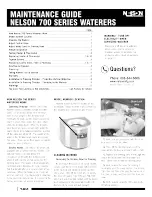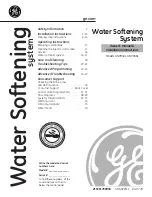
200 amp Mig
Welder
Provides excellent welding
performance across a broad
range of applications
Code 55308
200 amp Mig
Welder
Operating & Safety Guide HW055
Operating & Safety Guide HW055
HW055/01
HW055/01
©HSS Hire Service Group Ltd 2013 No. HW055/01
Group Office: 25 Willow Lane, Mitcham, Surrey CR4 4TS
Web Site: http://www.hss.com
…any comments?
If you have any suggestions to enable us to improve the
information within this guide please e-mail your comments or
write to the Safety Guide Manager at the address below
e-mail: safety@hss.com
... have you been trained
The law requires that personnel using this type of equipment in
the workplace must be competent and qualified to do so.
Training is available at HSS Training
0845 766 7799
TECHNICAL SPECIFICATIONS
Primary Voltage
230VAC / 110VAC
Supply Voltage Range
230V±10% / 110V±10%
Number of Phases
Single Phase
Supply Frequency
50 / 60 Hz
Generator Requirement
7kVA(230V) / 4.5kVA(110V)
Open Circuit Voltage
79V
Input Current
15A (230V) / 18.3A(110V)
Current Range
10-210A (230V)/10-140A (110V)
Wirefeed Speed Range
2.5-18m/min
assume you have the wrong equipment for the job. Contact
HSS Hire for advice.
Keep the equipment clean
- you will find this less of a
chore if you clean it regularly, rather than wait until the end
of the hire period.
When not in use, store the equipment somewhere
clean, dry and secure.
EQUIPMENT CARE
FINISHING OFF
Switch OFF and unplug the unit. Leave everything to
cool then take the earth clamp off the work.
Where applicable remove the welding rod, disconnect
all leads and coil them up neatly.
Collect all parts together and give them a final clean up
ready for return, to HSS Hire.
For advice
on the safety and suitability of this equipment
contact HSS Hire.
There is a serious risk of personal injury if you do not
follow all instructions laid down in this guide.
The hirer has a responsibility to ensure that all
necessary risk assessments have been completed prior
to the use of this equipment.
Most welding tasks may be considered as hot work in site
situations and may be subject to specific permits to work.
This equipment should only be used by an operator
who has been deemed competent to do so by his/her
employer.
This equipment should be used by a competent adult
who has read and understood these instructions.
Anyone with either a temporary or permanent disability,
should seek expert advice before using it.
Keep children, animals and bystanders away from the
work area. Cordon off a NO GO area using cones and
either barriers or tape, available for hire from HSS Hire.
Welding screens are also available for hire from HSS Hire.
Never use
this equipment if you are
ill, feeling
tired,
or
under the influence of alcohol or drugs.
Cover your skin. Wear practical, dry, hole-free
insulating gloves, protective clothing and
footwear.
Avoid loose garments and jewellery that could
catch in moving parts, tie back long hair.
Insulate yourself from work and ground using dry
insulating mats or covers.
Ensure the work area is well lit and ventilated,
a fume
extractor or smoke eliminator should be used. If in doubt,
ask about lighting and ventilation equipment at HSS Hire.
Do not work near flammable gases or liquids
, petrol or
paint thinner fumes for example.
Keep combustible
materials at a safe distance
- at least 5m.
Watch for fire, and keep a fire extinguisher nearby.
This equipment generates potentially harmful
noise levels.
To comply with health and safety at work
regulations,
ear defenders must be worn
by everyone in
the vicinity.
A head shield with suitable shading MUST be worn
by anyone in the work area – goggles are not
suitable.
Avoid loose garments and jewellery that could
interfere with the work.
If the headshield o r lens becomes damaged, return it to
HSS Hire.
Fumes produced by the welding process, if inhaled,
can be harmful to health.
A suitable mask must be
worn when using this equipment.
Respiratory protective
equipment is available for hire,
contact HSS Hire for
GENERAL SAFETY
ELECTRICAL SAFETY
WARNING
IF YOU ARE WEARING AN ELECTRONIC LIFE
SUPPORT DEVICE (A HEART PACEMAKER) YOU
MUST CONSULT YOUR DOCTOR BEFORE GOING
NEAR OR WORKING WITH THIS EQUIPMENT.
MAGNETIC FIELDS ASSOCIATED WITH HIGH
CURRENTS MAY AFFECT THESE DEVICES.
WARNING
TOUCHING LIVE ELECTRICAL PARTS CAN CAUSE
FATAL SHOCKS OR SEVERE BURNS. THE ELECTRODE
AND WORK CIRCUIT IS ELECTRICALLY LIVE
WHENEVER THE OUTPUT IS ON. THE INPUT POWER
CIRCUIT AND MACHINE INTERNAL CIRCUITS ARE
ALSO LIVE WHEN POWER IS ON.
details.
Do not weld in locations near degreasing, cleaning, or
spraying operations.
The heat and rays of the arc can react
with vapours to form highly toxic and irritating gases.
Do not weld on coated metals, such as galvanized lead,
or cadmium plated steel, unless the coating is removed
from the weld area, the area is well ventilated, and if
necessary, while wearing an air supplied respirator.
The
coatings and any metals containing these elements can
give off toxic fumes if welded.
Never use welding equipment near computers or any
sensitive electronic equipment. Observe potential
electromagnetic problems in the surrounding area.
Make sure you know how to switch this machine OFF
before you switch it ON in case you get into difficulty.
If working
above floor level, wear a safety harness
to
prevent falling.
Always switch equipment OFF before making any
adjustments to it. Never leave it switched ON and
unattended.
Keep the power unit’s air vents clear of all obstructions.
Always transport, store and operate the machine in an
upright position.
Never dip electrode holder in water to cool it or lay it
down on the ground or the work surface. Do not touch
holders connected to two welding machines at the same
time or touch other people with the holder or electrode.
Do not wrap cables around your body.
Always ground the workpiece to a good electrical
(earth)
ground.
Do not touch electrode while in contact with the work
(ground)
circuit.
Use protective screens or barriers to protect others from
flash and glare; warn others not to watch the arc.
Turn off all equipment when not in use. Disconnect power
to equipment if it will be left unattended or out of service.
Do not touch live electrical parts.
Check the condition of the equipment before use.
If it shows signs of damage or excessive wear, return it to
HSS Hire.
COSHH information sheets are available from HSS Hire.
LET IT COOL
HANDLE WELDING EQUIPMENT AND WORK
WITH CARE – IT WILL BE HOT. LEAVE EQUIPMENT
TO COOL BEFORE CHANGING WELDING RODS,
MOVING EARTH CLAMPS, AND SO ON.
VEHICLE SAFETY
BEFORE CARRYING OUT WELDING WORK ON
CARS/LORRIES AND SIMILAR VEHICLES...
REMOVE THE VEHICLE’S BATTERY AND DISCONNECT
THE ALTERNATOR.
REMOVE ALL COMBUSTIBLE MATERIAL AND OTHER
FIRE/EXPLOSION HAZARDS.
GAS CYLINDERS
IF WORKING WITH GAS CYLINDERS HANDLE THEM
WITH CARE. IF DAMAGED, A CYLINDER CAN
EXPLODE.
PROTECT COMPRESSED GAS CYLINDERS FROM
EXCESSIVE HEAT, MECHANICAL SHOCKS, AND ARCS.
INSTALL AND SECURE CYLINDERS IN AN UPRIGHT
POSITION BY CHAINING THEM TO A STATIONARY
SUPPORT OR EQUIPMENT CYLINDER RACK TO
PREVENT FALLING OR TIPPING.
KEEP CYLINDERS AWAY FROM ANY WELDING OR
OTHER ELECTRICAL CIRCUITS.
NEVER ALLOW A WELDING ELECTRODE TO TOUCH
ANY CYLINDER.
The HSS 200 amp Mig Welder unit must be powered from a
230/110V mains supply,
Extension leads must always be
protected by armoured cable.
Keep flexes and leads out of harm’s way. Never run them
through water, over sharp edges, or where they could
trip someone.
If the welder fails, or if its flex or plug
(if fitted)
gets
damaged, return it. Never try to repair it yourself.
Do not use electrical equipment in very damp or wet
conditions, it can be dangerous.
SAFETY OUTFIT
Welding helmet
Boots
Hearing
protection
Gloves
Flame-proof
clothing
The electrode wire stick out from the MIG gun nozzle should
be between 10mm to 20.0mm. This distance may vary
depending on the type of joint that is being welded.
The speed at which the molten pool travels influences the
width of the weld and penetration of the welding run.
STICK WELDING
Place yourself in a comfortable position before beginning to
weld. Get a seat of suitable height and do as much work as
possible sitting down. Don't hold your body tense. A taut
attitude of mind and a tensed body will soon make you feel
tired. Relax and you will find that the job becomes much
easier. You can add much to your peace of mind by wearing
a leather apron and gauntlets. You won't be worrying then
about being burnt or sparks setting alight to your clothes.
Place the work so that the direction of welding is across,
rather than to or from, your body. The electrode holder lead
should be clear of any obstruction so that you can move your
arm freely along as the electrode burns down. If the lead is
slung over your shoulder, it allows greater freedom of
movement and takes a lot of weight off your hand. Be sure
the insulation on your cable and electrode holder is not
faulty, otherwise you are risking an electric shock.
Practice this on a piece of scrap plate before going on to
more exacting work. You may at first experience
contact with the work and failing to withdraw the electrode
quickly enough. A low amperage will accentuate it. This
freezing-on of the tip may be overcome by scratching the
electrode along the plate surface in the same way as a match
is struck. As soon as the arc is established, maintain a 1.6mm
to 3.2mm gap between the burning electrode end and the
parent metal. Draw the electrode slowly along as it melts
down.
TIG WELDING
TIG Welding is generally regarded as a specialised process
that requires operator competency. While many of the
principles outlined in the previous Arc Welding section are
applicable a comprehensive outline of the TIG Welding
process is outside the scope of this Operating Manual. For
further information please contact HSS Hire.
Never push the equipment beyond its design limits.
If it
will not do what you want with reasonable ease and speed,




















